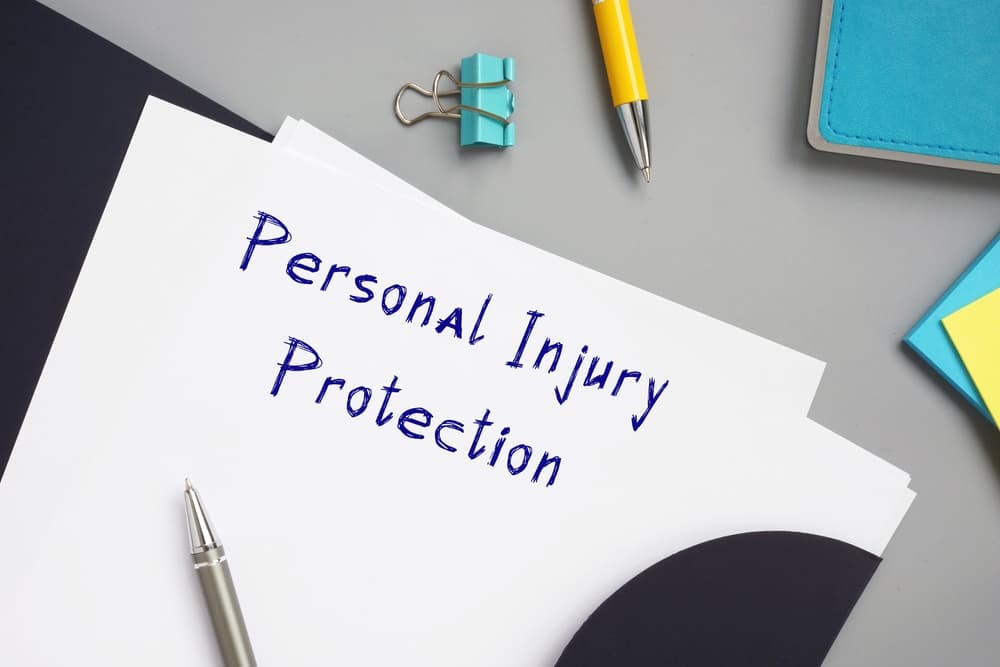What Is Personal Injury Protection?

Personal Injury Protection (PIP) is auto insurance coverage that pays for medical expenses and other related costs after a car accident, regardless of who was at fault. Often called no-fault insurance, PIP ensures that accident victims receive prompt medical treatment without waiting for a liability determination.
PIP coverage typically includes hospital bills, doctor visits, rehabilitation costs, and sometimes lost earnings if your injuries prevent you from working. It may also cover essential services such as childcare or transportation if your injuries limit your ability to perform daily tasks.
PIP may provide funeral expenses in the unfortunate event of a fatal accident.
Several states, including Florida, New York, and Michigan, require drivers to carry PIP as part of their mandatory insurance policies. In these states, injured drivers and passengers must first turn to their own PIP coverage before pursuing compensation from another party, unless their injuries meet a certain severity threshold.
PIP differs from liability insurance, which covers damages you cause to others, and health insurance, which may require deductibles, co-pays, or provider restrictions. PIP offers more immediate access to treatment and can help fill gaps in coverage after a crash.
However, PIP does have limits—both in terms of the dollar amount and the types of expenses it covers. Once you exceed these limits, you may need to explore other options for recovery, including a personal injury claim against the at-fault driver.
After an accident, understanding your PIP benefits and how they interact with other coverages is important. A car accident attorney can guide you through this process, file claims correctly, and ensure you receive the full benefits available under your policy.
What Does Personal Injury Protection (PIP) Cover?
Personal Injury Protection (PIP) is critical to auto insurance in many states. The main goal of PIP is to provide immediate financial assistance for injury-related expenses after a car crash, helping victims get timely medical care and maintain some monetary stability while they recover.
Understanding what PIP covers can help you make informed decisions following an accident.
- Medical expenses: The cornerstone of PIP coverage is payment for reasonable and necessary medical expenses resulting from the accident. These expenses typically include hospital stays, doctor visits, surgeries, X-rays, physical therapy, and prescription medications. PIP will cover treatment costs quickly, ensuring you get the necessary care without waiting to establish liability.
- Lost earnings: If your injuries prevent you from working, PIP often compensates for lost earnings. This assistance helps replace some of your income during recovery, so you do not face financial hardship. The amount and duration of lost earnings benefits vary by state and policy limits.
- Essential services: Many PIP policies also cover services you might need but cannot perform due to your injuries. These tasks can include household chores, childcare, yard work, or transportation to medical appointments. By covering these tasks, PIP helps lessen the practical burdens injuries create in your daily life.
- Funeral expenses: PIP may cover funeral and burial costs in tragic cases where an accident results in death. These funds can help ease the financial strain on surviving family members during an emotionally difficult time.
Limitations and Exclusions
It is important to remember that PIP has limits. Depending on state requirements, most policies have a maximum payout amount, such as $10,000 or $25,000. Also, PIP generally does not cover property damage or non-medical pain and suffering damages—separate claims or lawsuits will handle these costs. Pain and suffering can be a significant part of your car accident claim when you have suffered serious injuries. Additionally, some policies may exclude coverage if the injured person was not wearing a seatbelt or if the accident involved certain illegal activities.
Coordination with Other Insurance
PIP benefits often coordinate with health insurance, meaning they may pay first for accident-related medical costs before health insurance kicks in. Knowing how these coverages interact can prevent delays or gaps in your treatment. Even if you do not have enough PIP coverage for your medical bills, your health insurance provider will cover the gaps, so you are not without care.
In summary, PIP provides vital financial support for medical bills, lost income, essential services, and funeral expenses after a car accident. However, understanding your policy limits and exclusions is necessary. Consulting a car accident lawyer can help you navigate PIP claims effectively and ensure you receive all benefits you have a legal right to.
How to File a Personal Injury Protection (PIP) Claim
Filing a Personal Injury Protection (PIP) claim after a car accident is essential to receive coverage for your medical bills and related expenses promptly. While the process may vary slightly by state or insurance company, there are general steps you should follow to file your claim correctly and avoid delays.
- Notify your insurance company immediately: After an accident, contact your insurance provider immediately to report the incident. Most policies require prompt notification—usually within a few days—to qualify for PIP benefits. Provide details such as the date, location, and a brief accident description.
- Seek medical treatment promptly: To qualify for PIP coverage, you typically need to receive medical treatment related to the accident within a specific time frame (often 14 to 30 days). Even if your injuries seem minor, a healthcare professional should evaluate and document your condition. Keep detailed records of all medical visits, treatments, and expenses.
- Complete and submit claim forms: Your insurance company will provide specific claim forms that you must complete. These may require details about the accident, your injuries, medical providers, and lost earnings. Submit all forms along with supporting documents like medical bills, receipts, and pay stubs promptly to avoid delays.
- Keep detailed records: Maintain copies of all correspondence with your insurer, medical reports, and billing statements. Accurate records will help you track the claim’s progress and support your case if disputes arise.
- Follow up regularly: PIP claims can sometimes encounter delays or denials. Stay in regular contact with your insurance adjuster to check the status of your claim and promptly respond to any requests for additional information.
- Consult a car Accident attorney if needed: If the insurance company denies your claim or you are unsure how to proceed, consult a car accident attorney. A lawyer can help navigate the process, negotiate with insurers, and protect your rights.
Understanding Limitations and Exclusions in PIP Policies
While Personal Injury Protection (PIP) offers valuable benefits after a car accident, it is important to understand its limitations and exclusions. PIP coverage is not unlimited, and certain conditions may restrict or deny benefits.
Coverage Limits
Most PIP policies have a maximum payout amount—commonly ranging from $10,000 to $25,000—depending on your state’s requirements and specific insurance plans. Once you reach this limit, PIP will no longer cover additional expenses, meaning you may need to seek compensation through other insurance or legal action.
Scope of Coverage
PIP typically covers medical expenses, lost earnings, essential services, and funeral costs. However, it generally does not cover property damage or non-economic damages such as pain and suffering or emotional distress. Those types of claims usually require separate lawsuits or insurance claims.
Exclusions
Certain situations may exclude coverage. For example, suppose the injured person was driving under the influence of drugs or alcohol, intentionally causing the accident, or committing a crime at the time. In that case, your insurance company may deny your PIP benefits. In some states, failure to wear a seatbelt can also reduce or eliminate coverage.
Do You Need a Car Accident Lawyer When Dealing with PIP Coverage?

Even though Personal Injury Protection (PIP) should simplify the claims process by providing no-fault benefits, it is still wise to consult a car accident lawyer, especially if your injuries are severe or the insurance company delays or denies your claim. While PIP can offer quick access to medical treatment and lost earnings, it comes with limitations and complications that can affect your recovery.
One common issue is that PIP coverage has monetary caps, which vary by state. If your injuries do not qualify for PIP coverage or exceed the cap, you may have financial problems. A car accident lawyer can properly document your injuries so you receive full coverage.
Additionally, insurers may dispute whether treatment is “reasonable” or “necessary,” or they may delay payments. An attorney can step in to push back against these denials and help you fight for the benefits you have a legal right to.
If your expenses exceed your PIP limits or your injuries are severe enough to meet your state’s legal threshold for filing a lawsuit, a lawyer can help you pursue a claim against the at-fault driver for additional compensation, including pain and suffering, future medical expenses, and other damages that PIP does not cover.
Even in straightforward cases, a car accident lawyer can provide peace of mind, ensure you submit all paperwork correctly, and help protect you from making costly mistakes. They can also advise you on what to say (and not say) to insurers and guide you through the legal process if your case escalates.
It Can Be Difficult to Deal with Your Own Insurance Company
Even though you have paid premiums to your own insurance company for years, do not assume that customer loyalty cuts both ways when you need them to cover your damages. Your insurance company may be challenging to deal with, making it difficult to get the full coverage you need under your PIP.
You may need an advocate when dealing with your insurance company to get the coverage you deserve under the terms of your policy. Otherwise, your insurance company may take advantage of you and leave you in a difficult financial situation when you count on it. Insurance companies may take your claim more seriously when they see that you have an experienced car accident attorney representing you.
Many car accident lawyers work on a contingency fee basis, meaning they only get paid if they win your case. This arrangement allows you to pursue the compensation you deserve without worrying about upfront costs or out-of-pocket expenses.
Your attorney will invest their time, resources, and experience in building a strong case on your behalf. If you do not win your case, you will not owe anything to your attorney. This setup ensures that your lawyer will work hard to achieve the best possible outcome.
Questions and Answers About PIP Insurance
How is PIP different from Medical Payments (MedPay) coverage?
PIP and MedPay both cover your medical bills regardless of fault, but they have key differences. PIP is more comprehensive and is only available in certain states. In addition to medical bills, PIP also covers lost wages and the cost of replacement services.
MedPay, available in more states, typically only covers medical and funeral expenses and usually has lower coverage limits.
Does PIP cover me if a car hits me while I am walking or riding a bike?
In many states, your own auto insurance PIP policy will cover your injuries if you are a pedestrian or bicyclist struck by a vehicle.
If you do not own a car but live with a relative who does, you may receive coverage under their policy. If neither applies, you might claim PIP benefits from the insurance policy of the driver who hit you.
What happens if the at-fault driver is from a state that does not have PIP?
Your ability to recover damages depends on the laws of the state where the accident occurred, not the at-fault driver’s home state.
If the accident happens in a PIP state, you first file a claim with your own PIP insurer for immediate expenses. You can then pursue a claim against the at-fault driver for damages exceeding your PIP coverage.
Do I have to pay my PIP benefits back if I win a lawsuit against the at-fault driver?
This depends on your state’s laws regarding subrogation. In some states, your insurance company has a right to recover the PIP benefits it paid you out of any settlement or verdict you receive from the at-fault party.
A lawyer can explain how subrogation rules in your state affect your total recovery.
A Personal Injury Lawyer Can Make All the Difference
Contacting a lawyer well-versed in personal injury law can make a significant difference in your case. They can handle the legalities while you focus on your recovery, protecting your rights every step of the way. Reach out to an experienced personal injury lawyer today.

